Manger Conjugation in All 8 Tenses
Manger in French is one of the most frequently used verbs. The meaning of manger is “to eat”.
This article gives you manger conjugations in the most common indicative tenses of the French language, as well as some hints on how you would use them in everyday speech. This article will also help you to learn correct grammar so your speech and communication skills in French become top notch!
Why only the 8 indicative tenses? Because those are the tenses you’ll hear when practicing your French! There are 13 other tenses but they have more to do with mood and some intent. On top of that they’re rarely used, so even if you’re an intermediate or advanced French learner then the indicative 8 are ALL you need!
Before you continue: Corrector provides a free tool to help you correct grammar and spelling in any language (including conjugations)! Just click here to access it!
French Tenses for Manger Conjugation
- Présent. Something that is happening now. This can either be ongoing or instant. Eg: I eat. / I’m eating.
- Imparfait (imperfect). Used to describe ongoing, continual or habitual past events. Eg: I was eating.
- Passé simple is not common and normally found in formal or literary contexts. If you’re a beginner or even intermediate French learner then you can safely ignore it for now (but it’s still included below for convenience). Eg: I ate.
- Passé composé. Widely used to talk about completed past actions. Eg: I ate.
- Futur simple (simple future) is used when you intend to describe a general future state of being. Eg: I will eat. Once again, beginners can generally ignore this conjugation as there’s a much simpler version (next in list) that will suffice for now.
- Futur proche (near future) describes an upcoming action. In English this would be “I am going to eat …“. This should be your go to future tense when learning conjugations.
- Plus-que-parfait (pluperfect). This tense indicates that an action had taken place and was completed before another past action took place. Eg: I ate it before eating my meal.
- Passé antérieur is not common at all (just like passé simple), and again is found in formal or literary contexts. Eg: I had eaten.
- Futur antérieur (future perfect) is used to describe a future action that will be completed in the future before another action is started. For example: I will have eaten before doing my homework.
Mastering manger conjugation in at least 3 tenses (present, passé composé and futur proche is essential for becoming proficient in French. In fact I would concentrate on these 3 and only study the others when they come up in literature or other contexts.
The following tables also give usage examples of manger used in its respective tense.
Manger Présent Conjugation (Present Tense):
| Pronoun | Conjugation | English Translation |
|---|---|---|
| Je | mange | I eat |
| Tu | manges | You eat |
| Il/Elle | mange | He/She eats |
| Nous | mangeons | We eat |
| Vous | mangez | You eat |
| Ils/Elles | mangent | They eat |
Présent (Present) Tense Usage: The Présent tense is used to describe actions or states that are happening at the current moment or are generally true. It is the most frequently used tense in all languages. Note that French doesn’t have the present continuous verb tense like in English. Hence, “I eat” and “I am eating” both translate to je mange.
Example sentences:
- Je mange une pomme. (I am eating an apple.)
- Tu manges du gâteau. (You eat some cake.)
- Nous mangeons ensemble. (We eat together.)
Manger Imparfait Conjugation (Imperfect Tense):
| Pronoun | Conjugation | English Translation |
|---|---|---|
| Je | mangeais | I was eating |
| Tu | mangeais | You were eating |
| Il/Elle | mangeait | He/She was eating |
| Nous | mangions | We were eating |
| Vous | mangiez | You were eating |
| Ils/Elles | mangeaient | They were eating |
Imparfait (Imperfect) Tense Usage: The Imparfait tense is used to describe ongoing or habitual actions from the past. It is commonly used to set the background for other actions in the past. In everyday French it is used to talk about past events or actions that were ongoing. In everyday French it is used to talk about past events or actions that were ongoing. Imparfait is also used to talk about feelings, attitudes, time & date and the weather.
Example sentences:
- Elle mangeait une glace quand il est arrivé. (She was eating an ice cream when he arrived.)
- Nous mangions toujours à midi. (We used to eat at noon.)
- Vous mangiez des fruits tous les matins. (You were eating fruits every morning.)
Manger Passé Simple Conjugation (Simple Past Tense):
| Pronoun | Conjugation | English Translation |
|---|---|---|
| Je | mangeai | I ate |
| Tu | mangeas | You ate |
| Il/Elle | mangea | He/She ate |
| Nous | mangeâmes | We ate |
| Vous | mangeâtes | You ate |
| Ils/Elles | mangèrent | They ate |
Passé Simple (Simple Past) Tense Usage: The Passé Simple manger conjugation is primarily used in written literature, especially within narrative texts such as novels, stories, and historical accounts. In everyday spoken language, the Passé Simple is rarely used but you will see it everywhere in the aforementioned literary works. In meaning there is virtually no difference between this tense and the Passé Composé.
Example sentences:
- Je mangeai une salade pour le déjeuner. (I ate a salad for lunch.)
- Ils mangèrent au restaurant hier soir. (They ate at the restaurant last night.)
- Tu mangeas tout le gâteau ? (Did you eat the whole cake?)
Manger Passé Composé Conjugation (Present Perfect Tense):
| Pronoun | Conjugation | English Translation |
|---|---|---|
| J’ai | mangé | I ate / have eaten |
| Tu as | mangé | You ate / have eaten |
| Il/Elle a | mangé | He/She ate / has eaten |
| Nous avons | mangé | We ate / have eaten |
| Vous avez | mangé | You ate / have eaten |
| Ils/Elles ont | mangé | They ate / have eaten |
Passé Composé (Present Perfect) Tense Usage: The Passé Composé tense is used to talk about completed actions in the past. It is one of the most common past tenses and is frequently used in everyday French language. The key fact you need when deciding to use this tense is to ask if the past action have a start and finish in the past. If yes, then Passé Composé is the tense you need!
Example sentences:
- J’ai mangé des pâtes pour le dîner. (I have eaten pasta for dinner.)
- Nous avons mangé au restaurant ce soir. (We have eaten at the restaurant tonight.)
- Ils ont mangé tout le chocolat. (They have eaten all the chocolate.)
Manger Futur Simple Conjugation (Simple Future Tense):
| Pronoun | Conjugation | English Translation |
|---|---|---|
| Je | mangerai | I will eat |
| Tu | mangeras | You will eat |
| Il/Elle | mangera | He/She will eat |
| Nous | mangerons | We will eat |
| Vous | mangerez | You will eat |
| Ils/Elles | mangeront | They will eat |
Futur Simple (Simple Future) Tense Usage: The futur simple manger conjugation is used to express an eating action that will happen in the future. It is commonly used in everyday language when talking about general future plans or intentions. If you find this tense complicated then you can always just use the “aller” form in the next section “futur proche”.
Example sentences:
- Je mangerai de la pizza ce soir. (I will eat pizza tonight.)
- Ils mangeront à la maison demain. (They will eat at home tomorrow.)
- Nous mangerons ensemble la semaine prochaine. (We will eat together next week.)
Manger Futur Proche Conjugation (Near Future Tense):
NOTE: Futur proche is not an “official” tense in French. Rather it is an alternate way of expressing “Futur Simple”!
| Pronoun | Conjugation | English Translation |
|---|---|---|
| Je | vais manger | I am going to eat |
| Tu | vas manger | You are going to eat |
| Il/Elle | va manger | He/She is going to eat |
| Nous | allons manger | We are going to eat |
| Vous | allez manger | You are going to eat |
| Ils/Elles | vont manger | They are going to eat |
Futur Proche (Near Future) Tense Usage: This is also known as the “going to [eat]” future tense. It is used to express actions that are planned or about to happen in the near future. It is very commonly used in everyday spoken French.
Example sentences:
- Je vais manger une glace tout de suite. (I am going to eat an ice cream right away.)
- Vous allez manger au restaurant ce soir ? (Are you going to eat at the restaurant tonight?)
- Ils vont manger des légumes pour être en bonne santé. (They are going to eat vegetables to be healthy.)
Manger Plus-que-parfait Conjugation (Pluperfect Tense):
| Pronoun | Conjugation | English Translation |
|---|---|---|
| J’avais | mangé | I had eaten |
| Tu avais | mangé | You had eaten |
| Il/Elle avait | mangé | He/She had eaten |
| Nous avions | mangé | We had eaten |
| Vous aviez | mangé | You had eaten |
| Ils/Elles avaient | mangé | They had eaten |
Plus-que-parfait (Pluperfect) Tense Usage: This tense is used to express actions that had happened before some other past action took place. It is commonly used in written language, especially in literature and formal texts.
Example sentences:
- J’avais mangé avant qu’il n’arrive. (I had eaten before he arrived.)
- Vous aviez mangé quand je suis arrivé. (You had eaten when I arrived.)
- Ils avaient mangé tout le gâteau avant la fête. (They had eaten the whole cake before the party.)
Manger Passé Antérieur Conjugation (Past Anterior Tense):
| Pronoun | Conjugation | English Translation |
|---|---|---|
| J’eus | mangé | I had eaten |
| Tu eus | mangé | You had eaten |
| Il/Elle eut | mangé | He/She had eaten |
| Nous eûmes | mangé | We had eaten |
| Vous eûtes | mangé | You had eaten |
| Ils/Elles eurent | mangé | They had eaten |
Passé Antérieur (Past Anterior) Tense Usage: This tense is a literary tense used in formal and historical writing. It is similar in meaning to the Plus-que-parfait tense (Pluperfect) but is considered more archaic and is mostly found in classical literature. As a French speaker you will hardly ever (if at all) use this tense!
Example sentences:
- J’eus mangé quand elle est arrivée. (I had eaten when she arrived.)
- Ils eurent mangé avant de partir. (They had eaten before leaving.)
- Nous eûmes mangé tout le repas. (We had eaten the entire meal.)
Manger Futur Antérieur Conjugation (Future Perfect Tense):
| Pronoun | Conjugation | English Translation |
|---|---|---|
| J’aurai | mangé | I will have eaten |
| Tu auras | mangé | You will have eaten |
| Il/Elle aura | mangé | He/She will have eaten |
| Nous aurons | mangé | We will have eaten |
| Vous aurez | mangé | You will have eaten |
| Ils/Elles auront | mangé | They will have eaten |
Futur Antérieur (Future Perfect) Tense Usage: The Futur Antérieur tense is used to express actions that will have been completed before a specific future point in time. In fact that preceding sentence is an exact example of it, using the phrase “will have been”. It is used both in written and spoken language.
Example sentences:
- J’aurai mangé avant de partir. (I will have eaten before leaving.)
- Ils auront mangé tous les bonbons. (They will have eaten all the candies.)
- Vous aurez mangé quand nous arriverons. (You will have eaten when we arrive.)
Wrap Up
Manger conjugation isn’t too difficult to learn as long as you stick to present, futur proche and imparfait tenses. You can safely ignore the others for now (but do come back when you’re happily proficient in French).
If you’d like to read more about French verbs, conjugation and tenses then check out this article on how to master French verb conjugations. Lot’s of great tips in there if you’re struggling!
Alternatively let us do the hard work of analysing your French texts by using our free tool!
Manger Conjugation Table Images (FREE to Download)
To download a zip file of all the Manger Conjugations simply click this link. Alternatively click the images below and save individual manger conjugations.
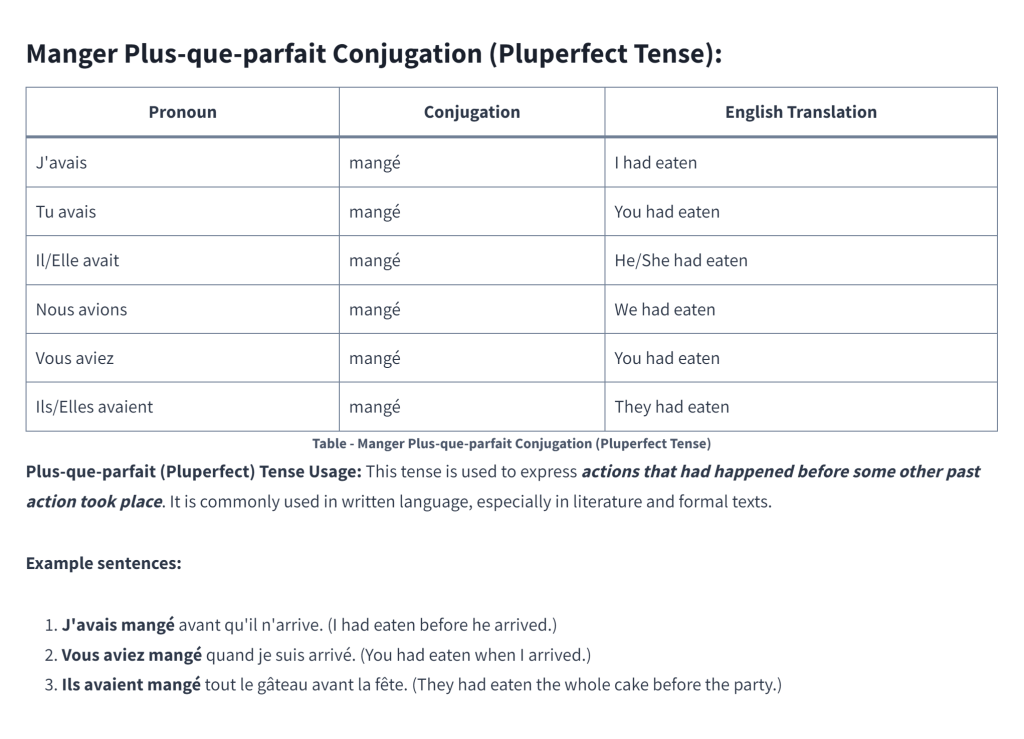
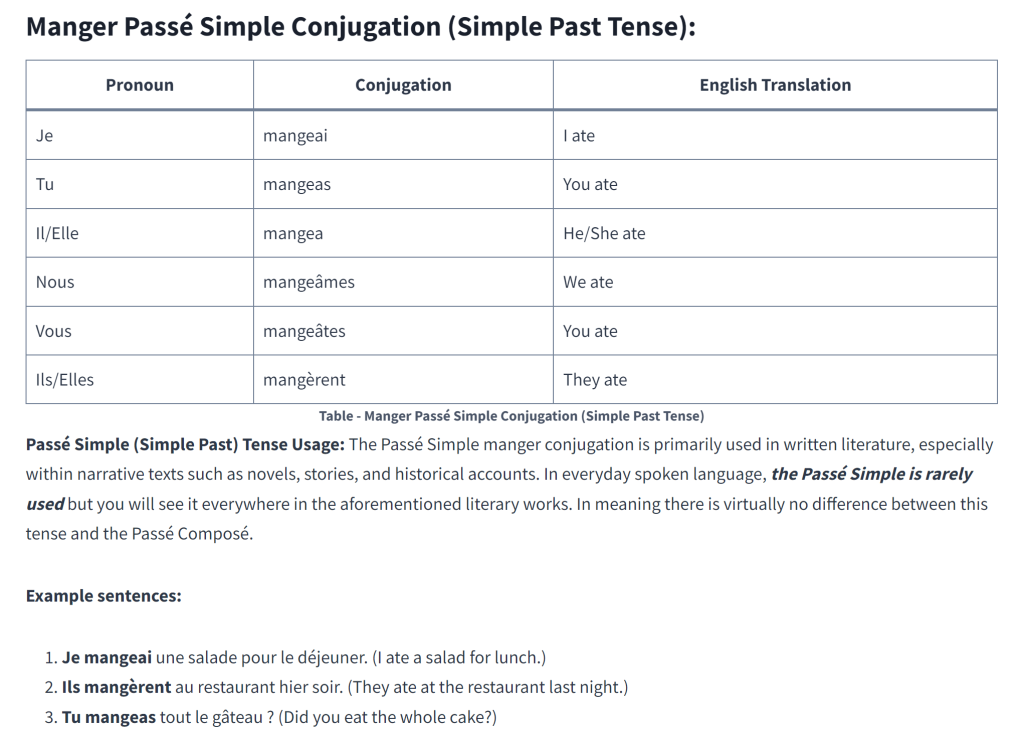
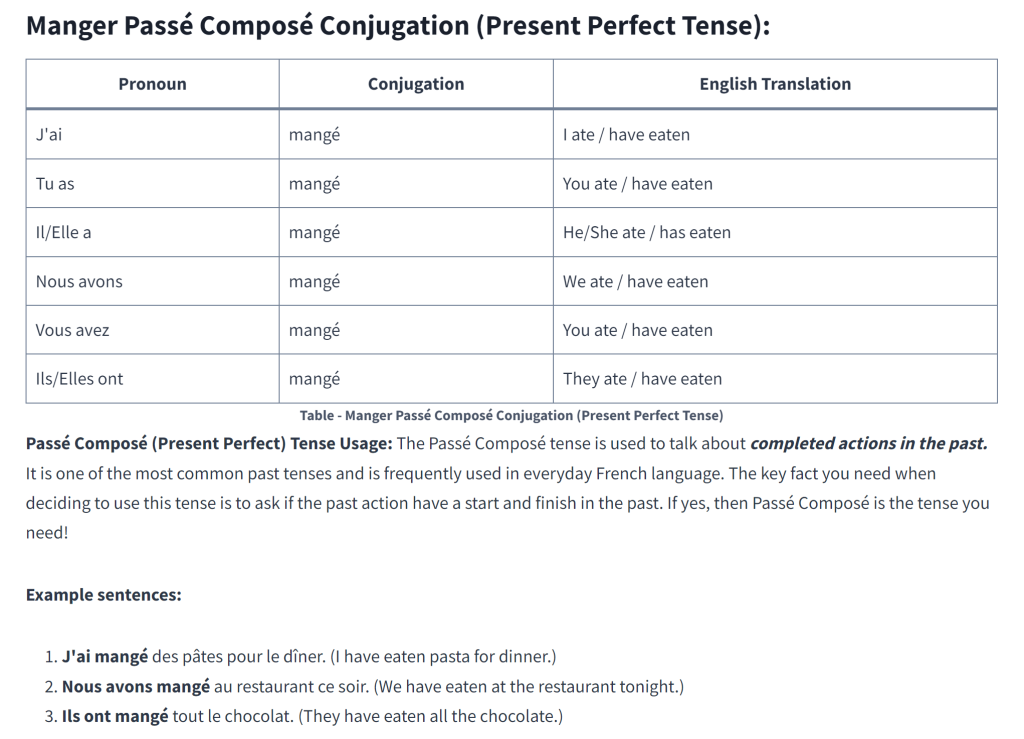
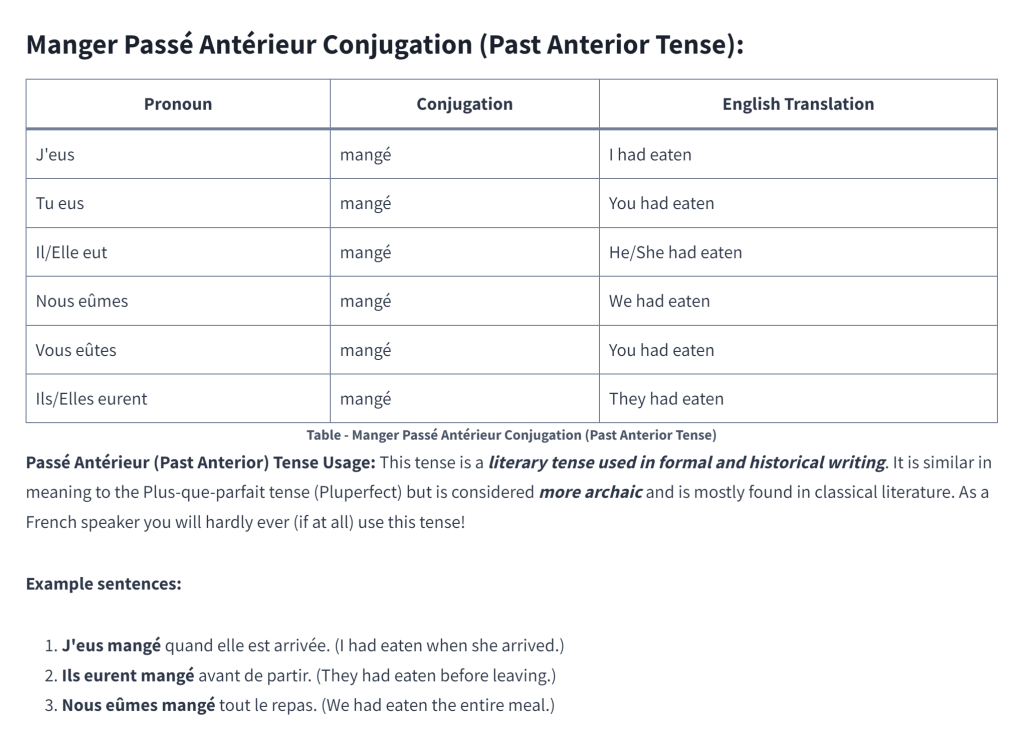
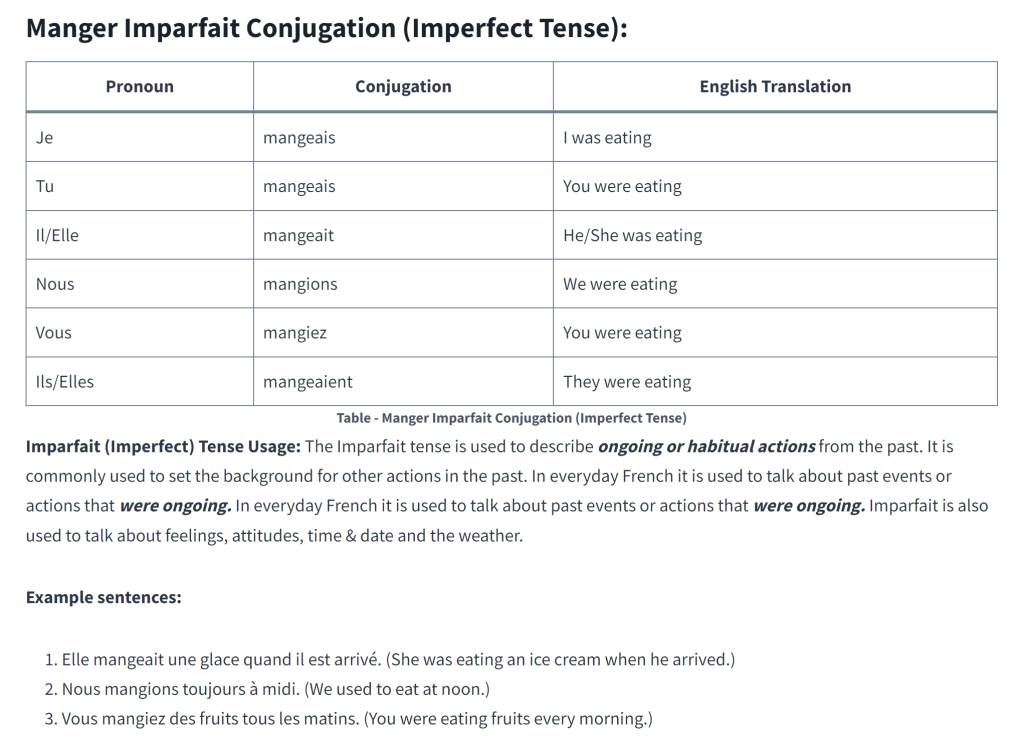
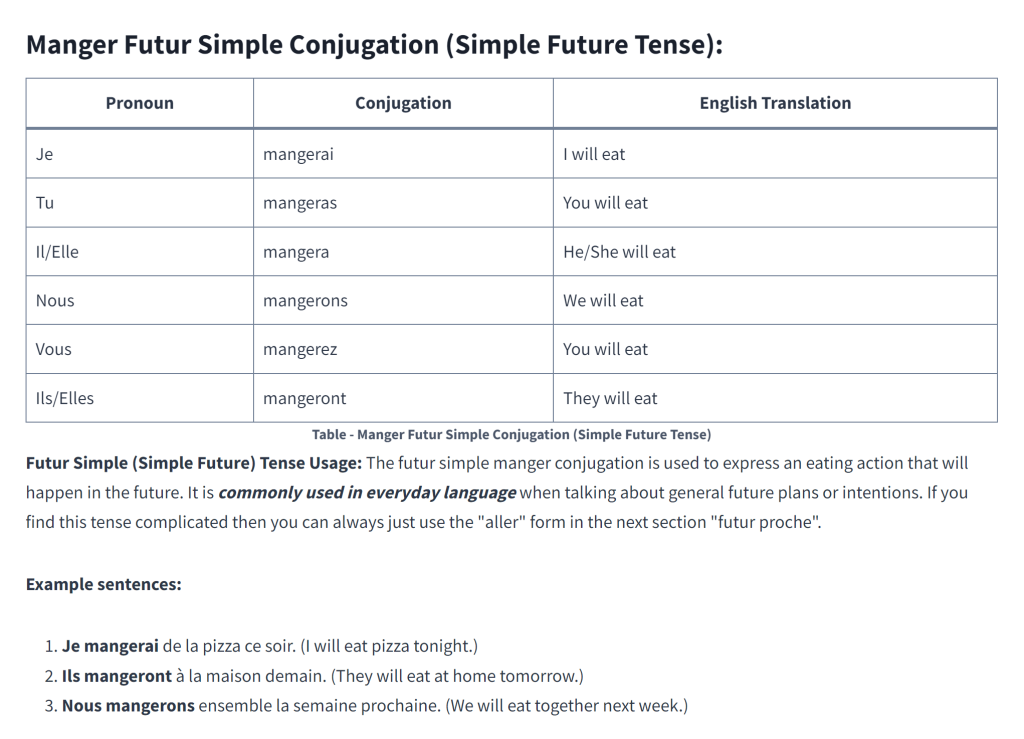
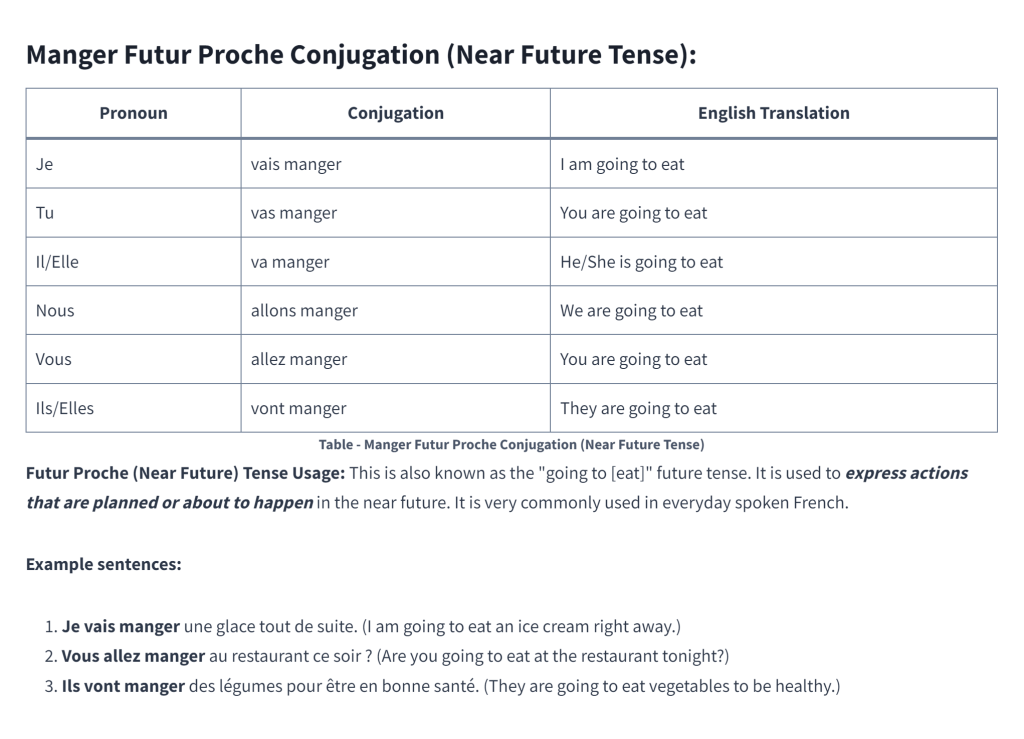
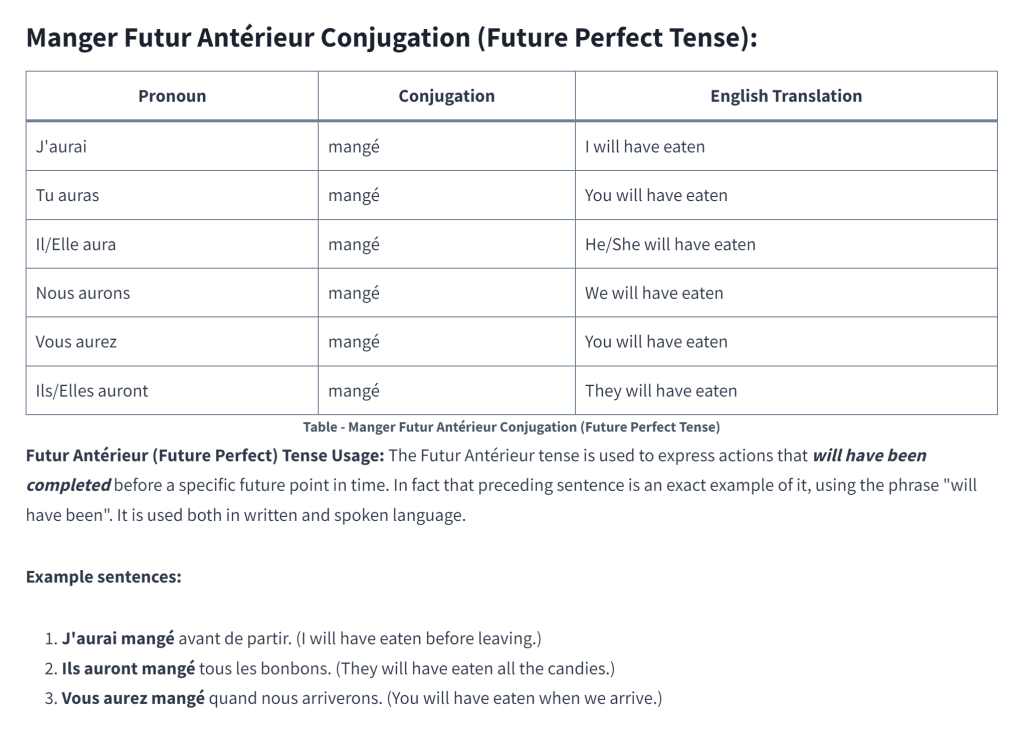
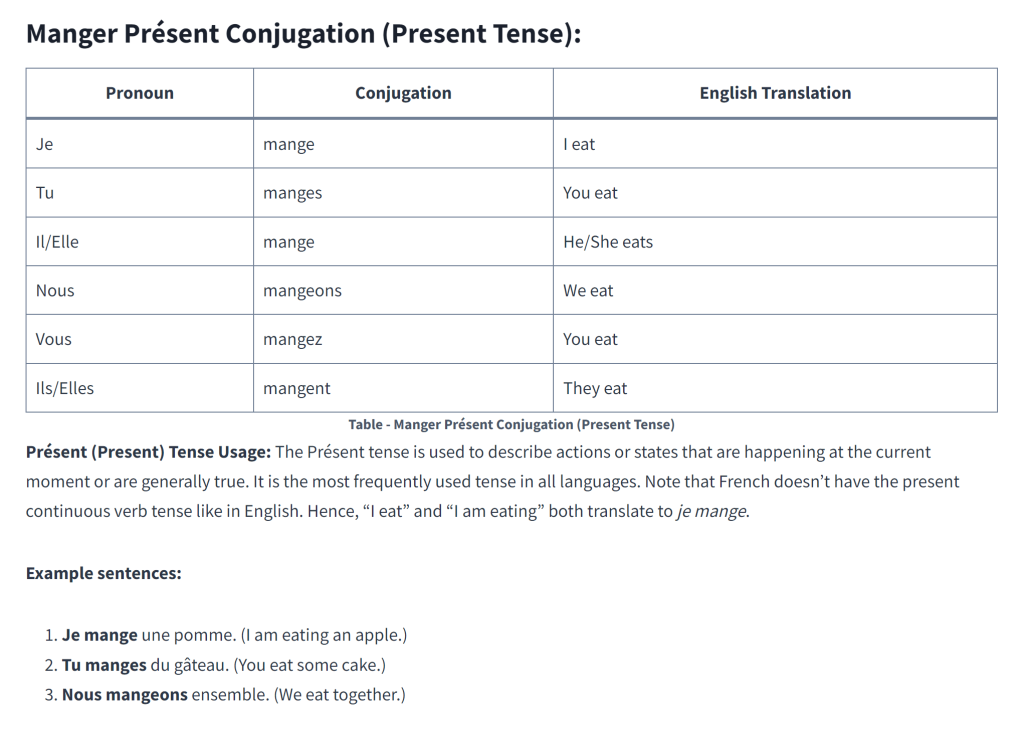
Other French Verb Conjugations You May be Interested In
We don’t only have manger conjugations! Here are some others you may want to check out! Also, check out this link which tells you the history of the word.
